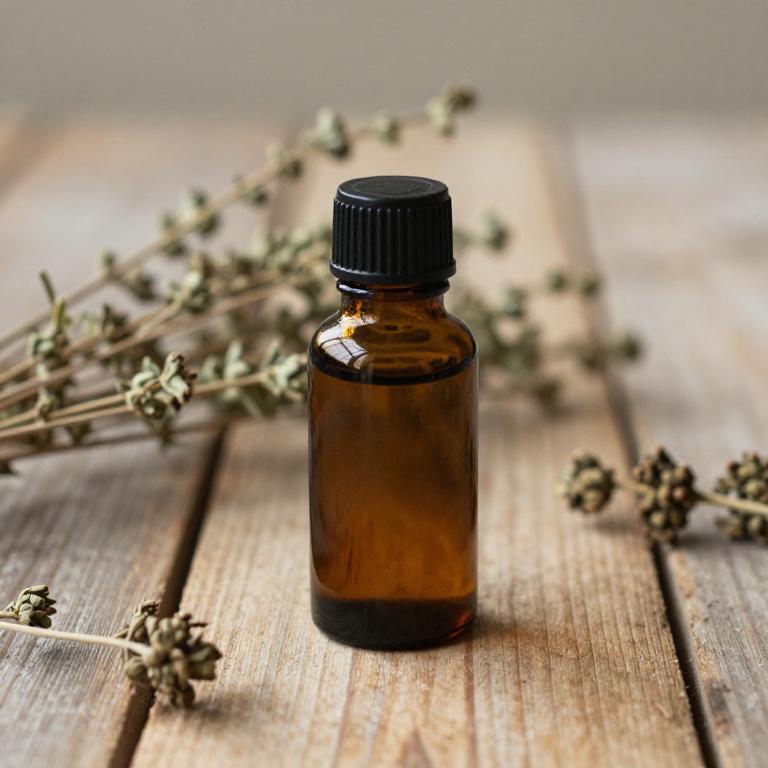10 Best Herbal Essential Oils For Chest Congestion

Herbal essential oils such as eucalyptus, peppermint, and lavender are commonly used to help alleviate symptoms of chest congestion due to their expectorant and anti-inflammatory properties.
These oils can be diffused into the air, inhaled directly, or applied topically to the chest and throat to provide relief from mucus buildup and respiratory discomfort. Eucalyptus oil is particularly effective for clearing nasal passages and loosening phlegm, while peppermint oil can help open airways and ease breathing. Lavender oil offers a calming effect and may reduce irritation in the respiratory tract.
When using essential oils, it is important to dilute them properly with a carrier oil and consult with a healthcare professional, especially for those with asthma or other respiratory conditions.
Table of Contents
- 1. Eucalyptus (Eucalyptus globulus)
- 2. Thyme (Thymus vulgaris)
- 3. Scots pine (Pinus sylvestris)
- 4. Peppermint (Mentha piperita)
- 5. Ginger (Zingiber officinale)
- 6. English lavender (Lavandula angustifolia)
- 7. Oregano (Origanum vulgare)
- 8. Rosemary (Rosmarinus officinalis)
- 9. Black elderberry (Sambucus nigra)
- 10. Basil (Ocimum basilicum)
1. Eucalyptus (Eucalyptus globulus)

Eucalyptus globulus, commonly known as blue gum eucalyptus, is a popular source of herbal essential oils used for alleviating chest congestion.
The essential oil is derived from the leaves of the plant through steam distillation, resulting in a potent and aromatic compound rich in cineole and other terpenic compounds. Its expectorant properties help loosen mucus and reduce the thickness of respiratory secretions, making it effective in clearing the airways. When used in steam inhalations or diffused in a room, the oil can provide relief from coughing and sore throat associated with chest congestion.
However, it is important to dilute the essential oil properly and consult a healthcare professional before use, especially for children or individuals with respiratory conditions.
2. Thyme (Thymus vulgaris)

Thymus vulgaris, commonly known as thyme, is a popular herb used in aromatherapy for its potent essential oils that can help alleviate chest congestion.
The essential oil of thyme contains compounds like thymol and carvacrol, which have strong antimicrobial and expectorant properties. When used in steam inhalation or diffused in a room, thyme essential oil can help loosen mucus and reduce inflammation in the respiratory tract. It is often recommended as a natural remedy for bronchial congestion and upper respiratory infections.
However, it should be diluted properly and used with caution, especially for those with sensitive skin or respiratory conditions.
3. Scots pine (Pinus sylvestris)

Pinus sylvestris, commonly known as Scots pine, produces a valuable essential oil that is often used for respiratory support, particularly in alleviating chest congestion.
The oil contains compounds such as alpha-pinene and beta-pinene, which have expectorant properties that help to loosen mucus and promote easier breathing. It is typically used in inhalation therapy or as a component in chest rubs to provide a warming and soothing effect on the respiratory system. The fresh, piney aroma of the oil also has a calming effect, helping to reduce stress and enhance the overall comfort of individuals suffering from chest congestion.
Due to its therapeutic properties, Pinus sylvestris essential oil is a popular choice in aromatherapy for respiratory health.
4. Peppermint (Mentha piperita)

Mentha piperita, commonly known as peppermint, is a popular herb used in the production of essential oils that can help alleviate chest congestion.
The essential oil derived from peppermint contains powerful compounds like menthol, which have decongestant and expectorant properties. When inhaled, the cooling effect of peppermint oil can soothe irritated airways and reduce mucus buildup in the respiratory tract. It is often used in steam inhalation or diffusers to provide relief from symptoms of colds, bronchitis, and other respiratory ailments.
However, it is important to use peppermint oil with caution, as it may cause skin irritation or interact with certain medications.
5. Ginger (Zingiber officinale)

Zingiber officinale, commonly known as ginger, is widely used in herbal medicine for its essential oils, which have been traditionally valued for their ability to alleviate chest congestion.
The essential oils derived from ginger contain bioactive compounds such as gingerol and shogaol, which possess anti-inflammatory and bronchodilatory properties. These properties help to reduce mucus production and ease breathing by relaxing the airway muscles. When used in steam inhalation or diffused into the air, ginger essential oil can provide a soothing effect on the respiratory system.
However, it is important to use these oils with caution and consult a healthcare professional, especially for individuals with existing respiratory conditions or allergies.
6. English lavender (Lavandula angustifolia)

Lavandula angustifolia, commonly known as English lavender, produces a calming and aromatic essential oil that has been traditionally used to support respiratory health.
The essential oil contains compounds like linalool and linalyl acetate, which possess anti-inflammatory and expectorant properties that may help alleviate chest congestion. When used in steam inhalation or diffused in a room, lavender essential oil can help open up airways and ease breathing. It is often combined with other respiratory-supporting oils like eucalyptus or peppermint for enhanced effects.
While lavender essential oil is generally safe, it should be diluted properly and used with caution, especially for children or individuals with sensitive skin.
7. Oregano (Origanum vulgare)

Oregano vulgare, commonly known as oregano, is a powerful herb whose essential oil is widely used for its therapeutic properties, including its ability to help alleviate chest congestion.
The essential oil contains high concentrations of compounds like carvacrol and thymol, which have antimicrobial, anti-inflammatory, and expectorant properties that can help loosen mucus and reduce respiratory discomfort. When used in steam inhalations or diffused into the air, oregano essential oil can help open up the airways and ease breathing in individuals suffering from colds, bronchitis, or other respiratory conditions. However, it is important to use this essential oil with caution, as it is highly concentrated and should always be diluted before application.
Due to its potent nature, it is recommended to consult with a qualified aromatherapist or healthcare professional before incorporating it into a treatment regimen for chest congestion.
8. Rosemary (Rosmarinus officinalis)

Rosmarinus officinalis, commonly known as rosemary, produces an essential oil that is widely used for its aromatic and therapeutic properties.
The essential oil of rosemary contains compounds like cineole and camphor, which have decongestant and anti-inflammatory effects, making it beneficial for relieving chest congestion. When diffused or applied topically, rosemary essential oil can help open up the airways and ease breathing by reducing mucus buildup. It is often used in aromatherapy to support respiratory health and alleviate symptoms of colds or bronchitis.
However, it should be diluted before topical application and used with caution, especially for those with sensitive skin or respiratory conditions.
9. Black elderberry (Sambucus nigra)

Sambucus nigra, commonly known as European elderberry, is traditionally used in herbal medicine for its potential respiratory benefits.
While the plant itself is often used in teas and syrups, its essential oils are less commonly utilized but have been explored for their antimicrobial and anti-inflammatory properties. These essential oils may help alleviate symptoms of chest congestion by reducing mucus production and soothing irritated airways. However, due to the plant's potential toxicity when consumed improperly, it is crucial to use Sambucus nigra essential oils under the guidance of a qualified herbalist or healthcare provider.
Despite its traditional use, scientific research on its efficacy for chest congestion remains limited, and it should not replace conventional medical treatments without professional consultation.
10. Basil (Ocimum basilicum)

Ocimum basilicum, commonly known as sweet basil, is a herb widely used for its aromatic essential oils, which are valued for their therapeutic properties.
The essential oil of basil contains compounds such as eugenol, linalool, and methyl chavicol, which possess anti-inflammatory and expectorant qualities. These properties make basil essential oil a popular natural remedy for relieving chest congestion by helping to loosen mucus and reduce respiratory inflammation. When used in steam inhalation or diffused in a room, it can provide soothing relief and improve breathing.
However, it is important to dilute the oil properly and consult a healthcare professional before use, especially for individuals with asthma or other respiratory conditions.